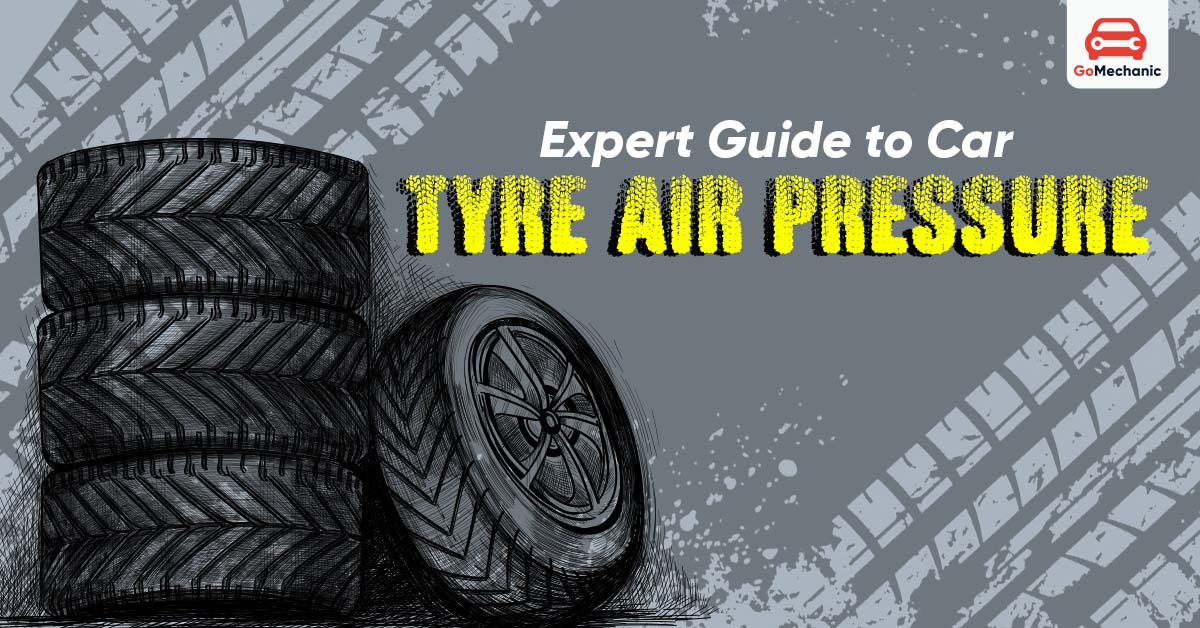Ever thought tyre pressure is just another box to check? But the reality is far from it. It is the secret to a safer drive. The right tyre air pressure means better mileage, comfort and happy tyres. Wondering how to get it just right?
This guide gives you practical tips, expert insights, and actionable advice to keep your tyres road-ready
Why does Tyre Pressure Even Matter?
Tyres are the only place where your car touches the road. Proper tyre pressure is needed for multiple reasons:
- Safety: Under-inflated tyres increase braking distance on wet roads by up to 11 metres.
- Fuel Efficiency: Maintaining correct tyre pressure improves fuel economy by 3-5%.
- Extended Tyre Life: Correct tyre pressure reduces uneven tread wear, prolonging tyre lifespan by up to 20%.
- Enhanced Comfort: Proper tyre pressure reduces vibrations and road noise.
Expert Tips for Checking and Adjusting Car Tyre Pressure
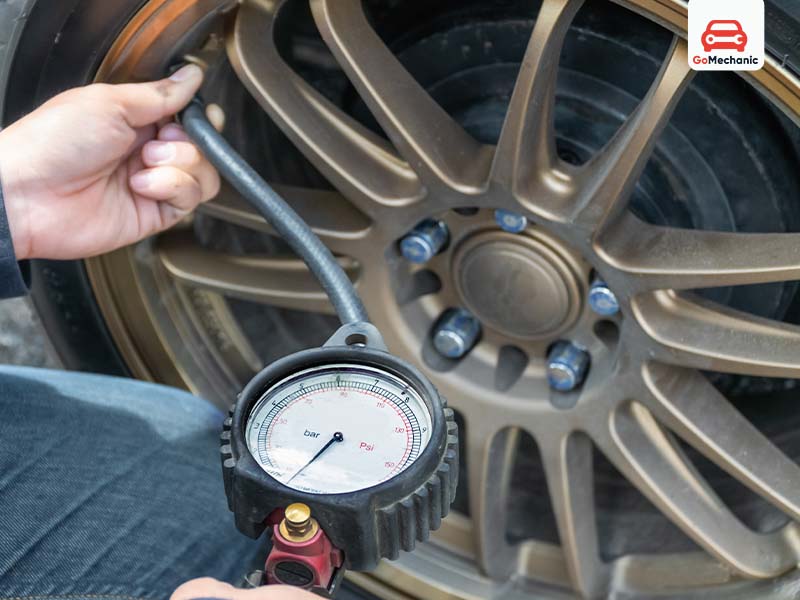
Properly checking and adjusting tyre pressure is a necessary car skill to have. Here’s how to do it correctly:
- Invest in a Quality Tyre Pressure Gauge: A digital gauge offers better accuracy. Some fuel stations have inaccurate gauges due to frequent use.
- Check When the Tyres Are Cold: Measure tyre pressure only when the vehicle hasn’t been driven for at least three hours.
- Follow a Routine: Check tyre pressure monthly.
- Portable Tyre Inflators: A portable car tyre air pump is convenient, especially during road trips. Most inflators connect to your car’s power outlet.
Others Read: The Smart Driver’s Guide to Car Tyre Selection
Recommended Tyre Pressure by Car Model and Brand
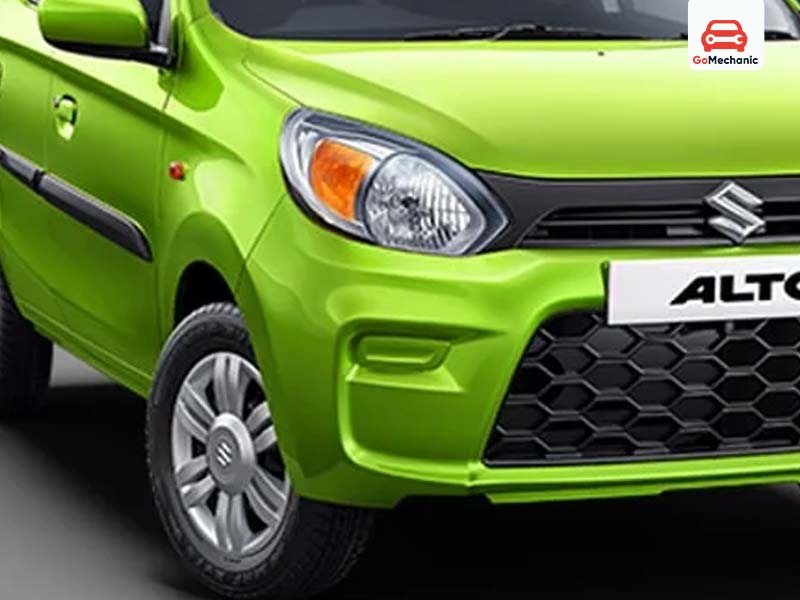
To simplify maintenance, here’s a quick reference table with recommended tyre pressures for popular car models:
| Brand | Model | Tyre Size | Front Pressure (PSI) | Rear Pressure (PSI) |
| Maruti Suzuki | Alto 800 | 145/80 R13 | 29 | 29 |
| Maruti Suzuki | Wagon R | 145/80 R13 | 33 | 33 |
| Hyundai | Grand i10 | 165/65 R14 | 33 | 33 |
| Hyundai | Creta | 215/60 R17 | 36 | 36 |
| Toyota | Fortuner | 265/60 R18 | 36 | 36 |
| Honda | City | 185/55 R16 | 33 | 33 |
| Ford | Endeavour | 265/60 R18 | 36 | 36 |
| BMW | X5 | 255/40 R19 | 33 | 33 |
| Audi | Q7 | 255/50 R19 | 33 | 33 |
Pro Tip: Consult a professional tyre technician for adjustments, if unsure.
Seasonal Car Tyre Pressure Adjustments: Why It’s Essential
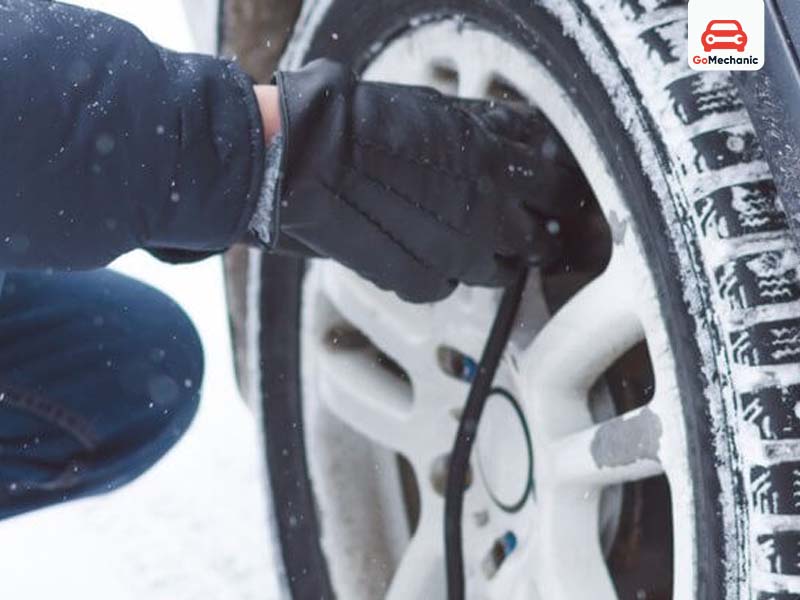
Weather changes majorly affect air pressure for car tyres. Adjustments are necessary to maintain safety and performance.
- Winter: Tyres lose about 1 PSI for every 12°C drop in temperature. In colder months, check tyre pressure often to avoid under-inflation.
- Summer: Hot weather causes tyre pressure to increase due to expansion. Check the tyre pressure of car and adjust as needed.
- Rainy Season: Wet roads reduce grip. Ensuring correct tyre pressure maintains traction on slippery surfaces.
Expert Tip: Reduce tyre pressure slightly (about 2 PSI below recommended) in rainy regions to increase road grip.
Nitrogen vs. Air: Which is Better for Tyre?
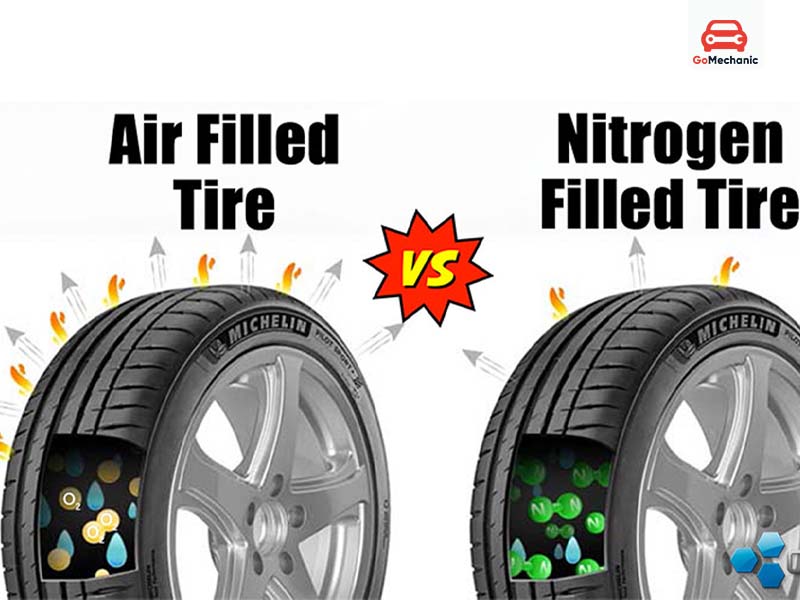
Nitrogen is popular for tyre inflation due to its inert nature. Many wonder if is worth the extra spending. Here’s a comparison to help you decide:
| Nitrogen | Air | |
| Stability | Less prone to temperature fluctuations | More prone to pressure changes |
| Availability | Limited to specialized centres | Widely available at fuel stations |
| Leak Rate | Slower, so it maintains pressure longer | Slightly faster natural leakage |
| Cost | Higher | Low, often free |
When to Use Nitrogen: Nitrogen is meant for high-performance and luxury vehicles. Nitrogen offers slight advantages in stability and leak resistance.
Others Also Read: A Brief Guide to Car Alloy Wheels
Tyre Pressure Myths vs. Facts
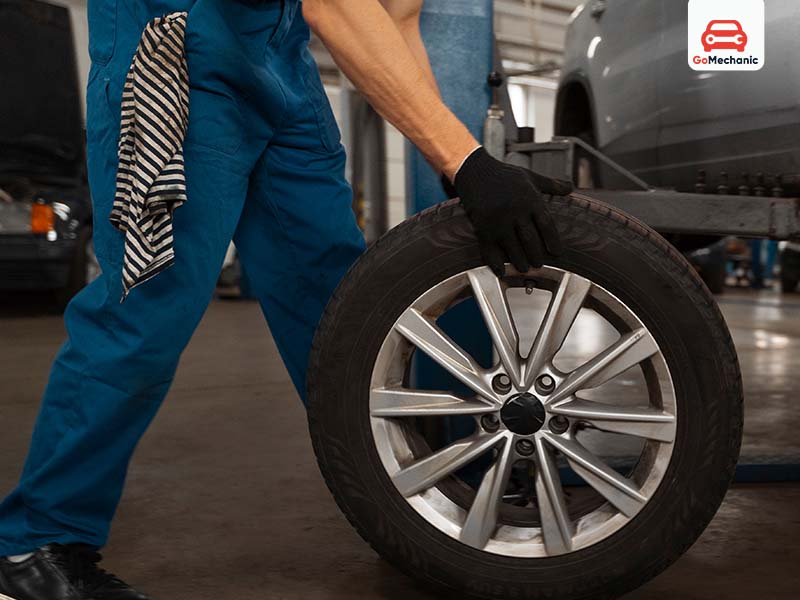
Myth 1: Over Inflated Tyres Improve Fuel Efficiency
Fact: No. It compromises grip and safety. Over-inflated tyres get damaged easily and reduce the ability to absorb shocks.
Myth 2: TPMS is Enough for Pressure Monitoring
Fact: TPMS (Tyre Pressure Monitoring Systems) alerts drivers of only extremely low pressure and does not provide exact readings. Regular manual checks ensure accurate tyre maintenance.
Myth 3: Tyre Pressure Only Affects Fuel Efficiency
Fact: Tyre pressure impacts more than fuel efficiency. It directly affects safety, handling, comfort, and even braking performance.
Practical Tips for Tyre Pressure Maintenance
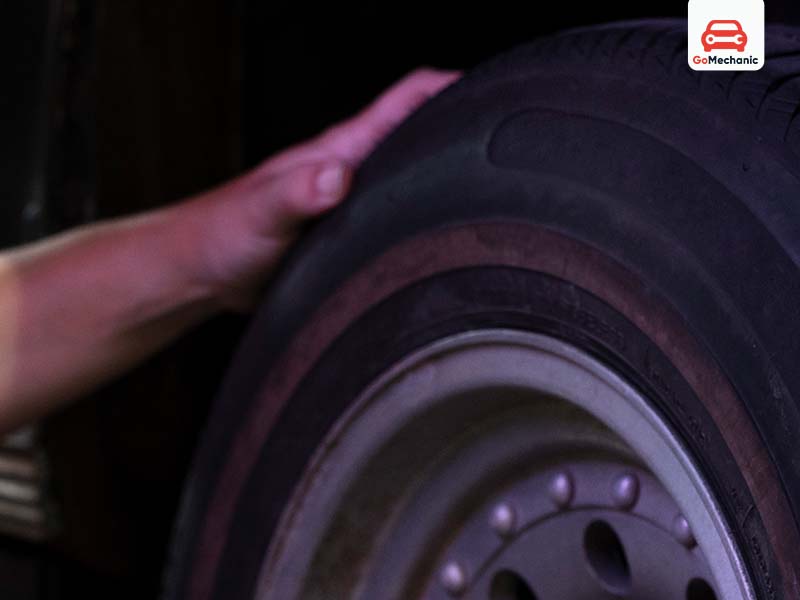
- Check Monthly: Aim to check tyre pressure at least once a month. Temperature changes and natural air leakage make this necessary.
- Look for Wear Patterns: Uneven tread wear equals incorrect tyre pressure.
- Outer Edge Wear: Under-inflation
- Centre Wear: Over-inflation.
- Include the Spare Tyre: Don’t forget to check the pressure on your spare tyre. It is your backup in emergencies.
- Professional Inspection: Have a professional inspection annually to check for alignment and balancing. Misalignment can lead to uneven wear and affect tyre pressure retention.
- Adjust Based on Load and Climate: Heavier loads and extreme temperatures require slight adjustments to the recommended PSI. Adding 2-3 PSI can help stabilize tyres for long trips with heavy luggage.
Take Charge of Tyre Health for Safety
The correct car tyre air pressure is a small but essential detail. It pays with improved fuel efficiency and longer tyre life.
Regular checks and adjustments will help maintain your tyres in top condition, providing a safer driving experience. Keep a routine and make regular tyre pressure checks a part of your regular vehicle maintenance.
FAQs on Air Pressure for Car Tyres
Q: What is the correct pressure for car tyres?
A: Typically 32-35 PSI. Please check your car’s manual or door placard for specifics.
Q: What is the normal pressure in a car tyre?
A: Most passenger cars need 32-35 PSI.
Q: Which air is good for car tyres?
A: Regular air is fine. However, nitrogen maintains pressure longer and is ideal for high-performance cars.
Q: What is the cost of nitrogen filling in India?
A: Nitrogen Filling costs ₹50-₹100 per tyre in India.
Q: How to calculate car tyre pressure?
A: Use a gauge on cold tyres. Match the recommended PSI and adjust if needed.
Q: Can I use nitrogen instead of air in my tyres?
A: Yes. Nitrogen holds pressure longer and suits high-performance cars. But regular air is easier and works well for daily driving.
Q: Does car tyre pressure affect braking on Indian roads?
A: Yes, low pressure increases stopping distances and reduces braking effectiveness.
Q: How do I know if my tyre pressure is too high or too low?
A: Under-inflated tyres feel “mushy” and may cause pulling. While over-inflated tyres create a bumpy ride and reduce grip.
Check Out: How to Pick the Best Tyres for Your Driving Needs
